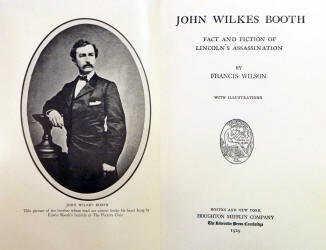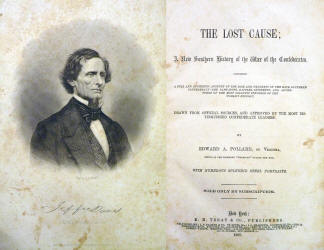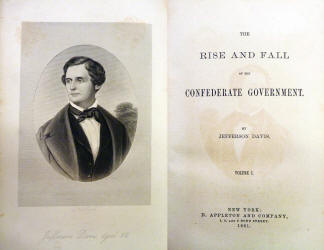|

|
Table of Contents
Home
Slavery
& Race
The South
Visual
Representations
Memorials
& Appropriations
Slavery
& Race
Sarah
Henderson
Joe Levell
Dan Haller
Nick
Schradle
The South
Dean DeChiaro
Steve Schaffer
Rick Ramirez
Visual
Representations
Alana Lemon
Jon Ingram
Peter Fúster
Aaron Stanton
Memorials
& Appropriation
Charles
Bennett
Molly Storer
Emma
Thorne-Christy
Other Online
Exhibits
|
The South
Introduction
The exploration texts of
Jefferson Davis, Edward A.
Pollard, and Francis Wilson
demonstrate a large array of
southern remembrance and
sentiments of the Civil War and
President Lincoln. In these
texts there is an increasing
tone of justification of
southerner rebellion as well as
swaying the war in favor of the
confederacy.[more]
In
The Rise and Fall of the
Confederate Government Davis concludes
that Lincoln and the federal
government were nothing more
than tyrants and the
confederacy was merely
exercising its
constitutional rights.
Similarly,
former
Richmond
Examiner publisher Edward
A. Pollard runs on the
foundation President Davis
laid out and attempts to
objectively re-write the
history of the war from a
Southern perspective. While
attempting to redirect
public memory of the South
throughout the novel,
Pollard went as far as to
say that Gettysburg was a
victory for the South.
Pollard also strategically
omits any mention of
President Lincoln’s
assassination.
Finally,
Francis Wilson provides a
face and back-story to
Lincoln’s killer, John
Wilkes Booth. Leading with a
Booth quote, “Our country
owed all her troubles to
him, and God simply made me
the instrument of his
punishment"[1], Wilson
identifies Booth as a “Lost
Cause” fanatic. Wilson
believes that Booth was a
spotlight-seeking assassin
who thought he would become
a staple in Southerners
memory of the Civil War.
These three
prime examples of the
south’s memory of the Civil
War and Lincoln, display a
common theme of southern
moral victory in the face of
a great tyrant. This view
helped many veterans and
natives of the South to
rationalize the war’s
outcome and the post war
era.
These examples
can also certainly be paired
with David W. Blight’s
Race and
Reunion, in which the
author touches on the
tradition of the Lost Cause
and how reconciliation could
stem from the Southern
ideology by separating
slavery from the cause of
the Civil War. Blight
recalls a speech given by
Robert E. Lee’s grandson
delivered in 1911, where he
suggested, “If the South had
been heeded, slavery would
have been eliminated years
before it was. It was the
votes of the southern states
which finally freed the
slaves.” [2] By twisting the
history and using this
strange logic, Lost Cause
believers could not be
absolved from the
responsibility of slavery
but also made them the true
abolitionists. As Blight put
it, “protected by such mists
of sentiment, the past could
be anything people wished.”
[3] Finally, the notion
created by Lost Cause
members stressed that even
when Americans lose, they
win. This indomitable
spirit, that Margaret
Mitchell infused into her
character Scarlett O’Hara in
Gone with the
Wind
(1936), and
such is the basis of the
enduring legend of Robert E.
Lee—through noble
character, he won by losing.
[4]
[1] Wilson, Francis.
John
Wilkes Booth: Fact and Fiction
of Lincoln's Assassination, 1st
ed. Boston: Houghton Mifflin,
1929. pg. xv.
[2] Blight, David W.
Race
and Reunion,
The
Civil War in American Memory.
Harvard
University Press, 2001. pg.
283.
[3] Ibid., pp. 283.
[4] Ibid., pp. 284.
|
|
 Wilson,
Francis. John Wilkes
Booth: Fact and Fiction of
Lincoln's Assassination Wilson,
Francis. John Wilkes
Booth: Fact and Fiction of
Lincoln's Assassination
1st ed. Boston:
Houghton Mifflin, 1929

-
Dean DeChiaro
It does not
take long to gather the
gist of Francis Wilson’s
John Wilkes
Booth: Fact and Fiction of
Lincoln's Assassination. The author
dedicates the volume to
Booth’s mother, Mary, whom
he writes suffered from
“unfathomable anguish”
following the night of
Lincoln’s death, which
brought “a pall of inky
blackness, and [spread]
sorrow everywhere”
(Wilson, vii). Wilson
provides a predictably
critical overview of
Booth’s life, tracing his
successful career as a
well-respected actor, his
downward spiral into Lost
Cause fanaticism, the
assassination, and finally
his miserable death in a
tobacco barn outside Port
Royal, VA. Wilson credits
Booth’s ambition to kill
Lincoln to a “morbid
thirst for notoriety” and
decries the soldier who
shot him for sparing Booth
“the disgrace of dying
like a criminal on the
gallows” (Wilson, 136,
180). Other accounts of
Lincoln’s assassinations
written during the
post-war period by
Wilson’s Northern
contemporaries,
unsurprisingly, usually
take the same opinion of
Booth.
Interestingly, despite the
fact that Wilson’s book
was published in Boston,
it presents an opinion of
Booth that would have been
found in Southern produced
books on the
assassination. In line
with Lost Cause ideology,
Southern sentiment towards
Booth was surprisingly
low. Had Lincoln lived to
serve through the
Reconstruction era, they
believed, the South would
have been treated with far
more lenience. Booth’s
fanatic blunder destroyed
any possibility of that
happening. Wilson’s Booth,
therefore, endures the
same hatred from both the
North and the South,
albeit for different
reasons.
Click
on Image
for Larger View
Return
to Top
|
|

Pollard,
Edward A. The Lost
Cause: A New Southern
History of the War of the
Confederates New York: E.B.
Treat & Co., 1866.

-
Steve
Schaffer
Edward A.
Pollard’s book looks at
the war between the states
from a decidedly Southern
point of view. He condemns
previous works about the
war and states, “the facts
of the War of the
Confederates in America
have been at the mercy of
many temporary agents;
they have been either
confounded with
sensational rumours or
discoloured by violent
prejudice: in this
condition they are not
only not History, but
false schools of public
opinion" (Pollard, 1). The
entire war is covered from
Fort Sumter to Appomattox.
Published just after the
war, it gives us a look
into what Southern
contemporaries thought of
the war and the Presidents
of each side. Pollard
promises in the foreword
that his latest rehashing
of the momentous events of
1861-65 would be free of
political slander and
would present fact rather
than opinion. Despite this
claim, Pollard falters
with his vow and loses
much objectivity, for
example, by claiming
Gettysburg was a victory
for the south. Pollard’s
tone of readdressing the
remembrance of fallen
Southern soldiers is very
similar to that described
in Drew Gaulpin Faust’s
study The Republic of
Suffering,
when she quotes President
McKinley’s 1898 speech in
Atlanta that “these heroic
dead” had in the preceding
year risked their lives in
the great war; “the brave
Confederates should be
officially honored
alongside their Union
counterparts.” [1] All of
this is of course
Reconciliation discourse
by putting the Civil war
behind the United States
and creating a sense of
nationalism among sections
that, up to 1865, had been
bitter enemies. This book
in itself is also a prime
example of the Lost Cause
discourse.
Throughout the
book, Pollard refuses to
acknowledge the US as a
national entity he instead
justifies Southern
secession based on the
idea that some inhabitants
of the pre-United States
British colonies
considered each state a
sovereign nation.
Remarkably, Pollard makes
little mention of slavery
and completely avoids any
mention of Lincoln’s
assassination.
[1]
Faust, Drew
Gilpin. This Republic of
Suffering: Death and the
American Civil War. New
York: Knopf, 2008.
pg. 269.
Click
on Image
for Larger View
Return to Top
|
|
 Davis,
Jefferson.
The Rise and
Fall of the Confederate
Government Davis,
Jefferson.
The Rise and
Fall of the Confederate
Government
New York: D.
Appleton and Co., 1881
-
Rick Ramirez

Following the
Civil War, the President
of the former Confederacy
Jefferson Davis spent a
few years researching and
writing for this work. The
objective of Davis is to
“show that the Southern
States had rightfully the
power to withdraw from a
Union into which they had,
as sovereign communities,
voluntarily entered"
(Davis, iv). In order to
substantiate this
argument, Davis writes a
two-volume work with
historical information
regarding the foundation
of the constitution, the
establishment of the
Confederacy, and various
legal and constitutional
precedents. Davis uniquely
demonstrates a strong
understanding of the
Constitution providing an
extremely insightful
constitutional analysis.
As a result, he advances
the Southern belief that
the “war waged by the
Federal Government against
the seceding States was in
disregard of the
limitations of the
Constitution and
destructive of the
principles of the
Declaration of
Independence” (Davis, iv).
Ultimately, through the
analysis of Davis, the
work argues the actions of
the Federal Government and
Lincoln were
unconstitutional and
tyrannical.
Click
on Image
for Larger View
Return to Top
|
|
| |
About
this Project / Acknowledgements
Occidental
College's "Lincoln Legacies"
Research Seminar was developed by
Dr. Jeremiah B.C. Axelrod, Adjunct
Assistant Professor of History.
The library project
is developed in collaboration with
the Special Collections
Department:
Dale Ann Stieber, Special
Collections Librarian with student
staff
Alana Lemon and Brittany Todd.
Main graphic
images:
|
Page last edited on 03/12/2013.
Occidental
College Library Special
Collections & College Archives
© 2010 Occidental College
|
|
|
|
|
|